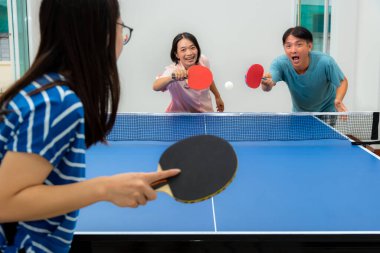Table tennis is not just a sport but a way of life. It is a game that requires both physical and mental agility, and it has been proven to have numerous health benefits. But did you know that it can also have a profound impact on your emotional well-being?
In today’s fast-paced and stressful world, many of us struggle with anxiety, depression, and other emotional challenges. We are constantly looking for ways to cope and find relief. This is where table tennis can help you.
This article contains information on the emotional benefit of table tennis.
Table tennis, also known as ping pong, is a popular indoor sport played by two or four players. It is played on a table with a dividing net, with players using small paddles, also known as rackets or bats, to hit a light ball back and forth over the net. It requires speed, concentration, and analytics to play this game. Let’s find out some of the possible emotional benefits that can be derived from playing table tennis.
10 Interesting Emotional Benefits Of Table Tennis
Playing table tennis can offer several emotional benefits. Here are some of them:
1. Improved focus and concentration
One of the notable emotional benefits of table tennis is that it enhances focus and concentration. Table tennis requires intense focus and attention due to quick movements and split-second decision-making.
Regularly playing table tennis can enhance your ability to concentrate, stay focused, and improve your hand-eye coordination. You can transfer these skills to other areas of life, which helps to increase mental sharpness.
2. Fun and enjoyment
Table tennis is an enjoyable and entertaining sport that can bring a sense of fun and excitement. The competitive aspect, whether playing with friends or participating in tournaments, can generate a sense of happens, thrill, fun and social interaction.
The joy of hitting a well-executed shot, scoring points, and experiencing fast-paced action can evoke positive emotions that enhance your emotional well-being.
3. Relieves you of stress
Engaging in a game of table tennis can be an excellent form of stress relief. The game’s fast-paced nature requires quick reflexes and focused concentration, diverting attention from daily worries and providing a temporary escape. The physical activity involved in playing table tennis can also release endorphins, promoting relaxation and reducing stress.
4. Improves memory and mental acuity
Studies have stated that the prefrontal and medial temporal cortexes that control thinking and memory are more in people that exercise than those that do not.
Table tennis is named the world’s best brain sport by D Daniel G. Amen because it involves you using different areas of your brain simultaneously, such as figuring out spins, tracking the ball, and planning strategies and shots. As such, table tennis players have higher cognitive capacities than others which positively influences emotional well-being.
5. Increased self-confidence
As you improve your table tennis skills, your self-confidence can grow. Mastering different shots, strategies, and techniques can boost self-esteem and provide a sense of achievement.
Winning matches or successfully executing challenging shots can further enhance self-confidence and give you a better perception of yourself, which positively reflects in other areas of your life.
6. Enhances social connection and interaction
Table tennis is often played in a social setting, allowing you to connect and interact with others. Whether playing with friends or family or joining a club or league, table tennis fosters teamwork, social bonds, and a sense of belonging.
Engaging in friendly competition and shared experiences can create a bond between you and other players. This helps you to get involved in a social family that can be of helps n other reasons in your life.
7. Enhances your reflexes
Furthermore, table tennis helps to enhance your reflexes. In table tennis, balls strike upwards for about 150 kilometers per hour, while the table is only 2,74 meters long. So this is impossible to hit such a ball without having quick reflexes.
This helps build your reflexes to act proactively in situations and everyday life. This makes table tennis one of the best games for older adults.
6. Provides a sense of control
Playing table tennis can provide a sense of control and mastery that can be empowering and boost self-esteem. Unlike many other sports, table tennis can be played indoors and in a relatively small space, making it accessible to people of all ages and abilities.
This means that players can practice and improve their skills at their own pace, which can give them a sense of control over their progress.
Also, table tennis is a game that requires a high degree of precision and accuracy, which can be challenging but also rewarding when players are able to execute a shot perfectly. This sense of control and mastery can translate into other areas of life, helping players feel more confident and capable.
8. Improves resilience
Another interesting emotional benefit of table tennis is that it can help build resilience by teaching players to cope with challenges and setbacks, and to keep trying even when things get difficult. In table tennis, as in life, there will be times when things don’t go according to plan. Players may miss shots, lose matches, or struggle to improve their skills.
However, the nature of the game encourages players to keep trying, to learn from their mistakes, and to keep pushing themselves to improve. This can help build resilience and a growth mindset, which can be valuable in all areas of life.
10. Promotes mindfulness
Lastly, table tennis requires players to be present and focused in the moment, which can promote mindfulness and reduce stress and anxiety.
When playing table tennis, players need to be fully engaged in the game, paying attention to the ball, their opponent, and their own movements. This can help quiet the mind and reduce feelings of stress and anxiety.
In addition, table tennis is a game that requires quick reflexes and split-second decision-making, which can help players develop their ability to stay focused and present in the moment.
Conclusion
Not all individuals experience the same emotional benefits of table tennis, but all within the above list frame. To enjoy these benefits, you can join a table tennis club and start playing.








